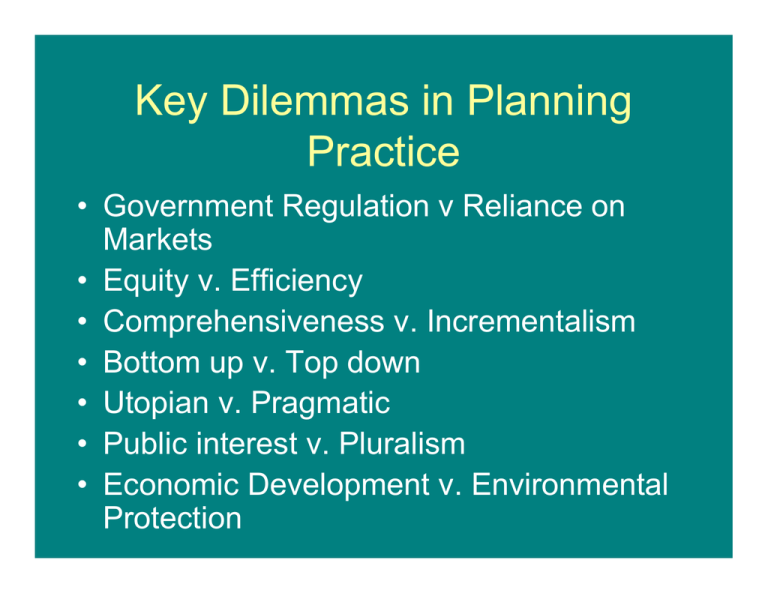Key Dilemmas in Planning Practice
advertisement

Key Dilemmas in Planning Practice • Government Regulation v Reliance on Markets • Equity v. Efficiency • Comprehensiveness v. Incrementalism • Bottom up v. Top down • Utopian v. Pragmatic • Public interest v. Pluralism • Economic Development v. Environmental Protection Government Regulation v. Reliance on Markets • When to rely on markets and market mechanisms? • When and how to respond to market failure? • Command-and-control v. other models of government regulation • Using and shaping market mechanisms for public purposes Equity v. Efficiency • What principles of equity or fairness ought to apply in public planning? • When might “more equality” be an inappropriate goal for public planning? • Under what circumstances might efficiency trump equity as a goal? • How should efficiency be measured? Comprehensiveness v. Incremental • What does it mean to take a comprehensive or systemic approach to a problem? • Under what circumstances is comprehensiveness a useful ideal for planners? • Under what circumstances is incremental a problematic objective? • How should the tension between comprehensiveness and incremental be managed? Bottom Up v. Top Down • Under what circumstances would a bottom-up approach to planning be inappropriate? • Under what circumstances might a top down approach to planning be necessary? • Can a bottom up approach to planning work at a regional or national scale? • Can a bottom up approach work if there is insufficient grassroots capacity? • Does a top down approach to planning increase the reliance on expertise? Public Interest v. Pluralism • Is there such a thing as the public interest? How should it be defined in any specific situation? • Is the public interest something more than the sum of individual or group interests? • Under what circumstances will a confrontation among interest groups produce the public interest? • Do we expect planners to be “engaged advocates” or “objective technicians”? Should they seek to represent specific interests or the public interest? Economic Development v. Environmental Protection • Are economic development and environmental protection always at odds? • Under what circumstances might they be mutually reinforcing as planning objectives? • Does sustainability offer a means of reconciling these objectives? • How should progress toward economic development and environmental protection be measured? Other Dilemmas • • • • Globalization v. community preservation Physical determinism v. social welfare Expertise v. indigenous knowledge Others?
